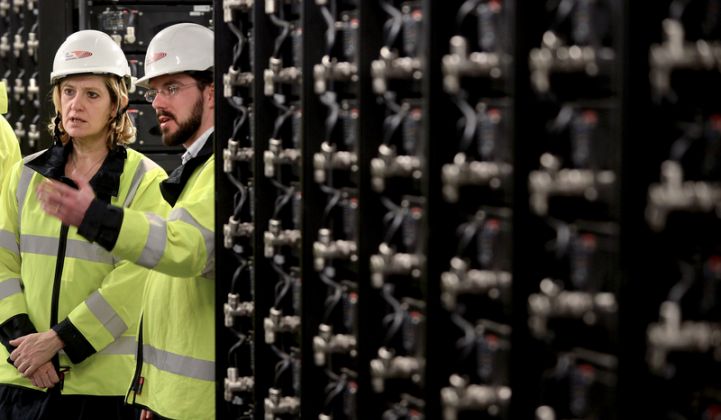Here’s another news item highlighting the growing strategic relationship between solar power and grid batteries. On Tuesday, German energy storage startup Younicos announced a $50 million investment from a consortium including U.S. thin-film solar PV giant First Solar.
It’s the biggest investment of the year for an energy storage startup -- although, in the case of Younicos, the term “startup” doesn't necessary apply. Founded in 2005, the Berlin-based company has previously raised about $200 million from investors including Korean lithium-ion battery maker Samsung and German-Japanese flow battery maker Gildemeister/DMG Mori Seiki, according to news reports. The new round also includes sustainability-focused private investment firm Grupo Ecos, and a third, undisclosed strategic lead investor -- most likely a battery manufacturer, if the company’s previous strategic investments are taken into account.
This is First Solar's first big move into energy storage, putting it a bit behind peers such as SunEdison, SunPower and Sharp. The Tempe, Ariz.-based U.S. PV market leader didn’t provide too many specifics on its immediate plans with Younicos. But in Tuesday's release, First Solar CTO Raffi Garabedian called utility-scale storage “an exciting new frontier for grid flexibility and modernization that can help to facilitate high penetration of renewables in certain circumstances. […] As the promise of storage continues to evolve, we are eager to understand how it will broaden our own power plant offerings.”
Dean Tuel, vice president of Americas for Younicos, commented briefly on the First Solar investment during a Tuesday session at Greentech Media’s Energy Storage Summit in San Francisco. With projects around the country, First Solar has invaluable data that can help identify sites where energy storage could make sense, and “that relationship with First Solar will help us map out those opportunities,” he said.
Younicos doesn’t make its own batteries. But it does make the software to control them for more than two dozen specific use cases, from local solar smoothing and peak shaving to system-wide frequency regulation or black-start support. It’s tapped its deep pockets to build out its own test grid in Berlin, featuring Samsung and NGK batteries.
It also manages more than 16 megawatts of large-scale battery projects in Europe, from hybrid battery systems on the Azores island of Graciosa and the Italian islands of Sicily and Sardinia, to grid-tied systems in Germany and the U.K. Last year, it bought the portfolio of bankrupt U.S. storage startup Xtreme Power, giving it another 60 megawatts of projects in North America.
That puts Younicos in the top tier of grid battery portfolio holders, behind AES Energy Storage, the business unit of U.S. energy giant AES, but ahead of contenders such as Greensmith, NEC Energy Solutions, and Tesla’s utility-scale battery business. As of April, it had about 120 megawatts of projects in final negotiations, and expected its 2015 backlog to triple the 21.5 megawatts it installed in 2014, according to Stephen Prince, the company’s chief revenue officer.
Younicos is one of a host of energy storage management system (ESMS) vendors building software to help design, deploy and control grid batteries, which is seen as an important step in scaling the business. Startups like Greensmith, Geli, and 1Energy, inverter makers like Enphase and SolarEdge, grid vendors like S&C Electric and General Electric, and battery makers such as Tesla, NEC and Panasonic are all bringing various sets of software capabilities to the industry.
This is a relatively new development, Praveen Kathpal, vice president at AES Energy Storage, noted at Tuesday’s Energy Storage Summit conference. As recently as the turn of the decade, grid battery projects were essentially done one at a time, with largely manual controls, he said.
“The integration was highly customized, the controls were low-tech, and the deployments were very site-specific,” he said. Since then, AES has developed its own software to manage batteries in relation to energy markets, and has a deep integration partnership with multiple battery, inverter, and other balance-of-systems equipment vendors.
This kind of standardization will be critical to bringing energy storage to its next phase of development, he said. “What’s going to make this next wave a success? It’s really three things: having complete solutions, building extensible platforms, and delivering valuable insights."
Younicos also announced Tuesday that it has been picked to be part of a German government-industry consortium to guide future stages of the country’s energy transition, or “Energiewende.” This consortium will target a region that generates more renewable energy than it consumes, and could receive up to 50 million euros ($53 million) in government funding, according to the company’s announcement.



